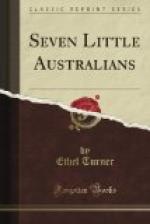Chapter I Chiefly Descriptive
Before you fairly start this story I should like to give you just a word of warning.
If you imagine you are going to read of model children, with perhaps; a naughtily inclined one to point a moral, you had better lay down the book immediately and betake yourself to ‘Sandford and Merton’ or similar standard juvenile works. Not one of the seven is really good, for the very excellent reason that Australian children never are.
In England, and America, and Africa, and Asia, the little folks may be paragons of virtue, I know little about them.
But in Australia a model child is—I say it not without thankfulness—an unknown quantity.
It may be that the miasmas of naughtiness develop best in the sunny brilliancy, of our atmosphere. It may be that the land and the people are young-hearted together, and the children’s spirits not crushed and saddened by the shadow of long years’ sorrowful history.
There is a lurking sparkle of joyousness and rebellion and mischief in nature here, and therefore in children.
Often the light grows dull and the bright colouring fades to neutral tints in the dust and heat of the day. But when it survives play-days and school-days, circumstances alone determine whether the electric sparkle shall go to play will-o’-the-wisp with the larrikin type, or warm the breasts of the spirited, single-hearted, loyal ones who alone can “advance Australia.”
Enough of such talk. Let me tell you about my seven select spirits. They are having nursery tea at the present moment with a minimum of comfort and a maximum of noise, so if you can bear a deafening babel of voices and an unmusical clitter-clatter of crockery I will take you inside the room and introduce them to you.
Nursery tea is more an English institution than an Australian one; there is a kind of bon camaraderie feeling between parents and young folks here, and an utter absence of veneration on the part of the latter. So even in the most wealthy families it seldom happens that the parents dine in solemn state alone, while the children are having a simple tea in another room: they all assemble around the same board, and the young ones partake of the same dishes, and sustain their parts in the conversation right nobly.
But, given a very particular and rather irritable father, and seven children with excellent lungs and tireless tongues, what could you do but give them separate rooms to take their meals in?
Captain Woolcot, the father, in addition to this division, had had thick felt put over the swing door upstairs, but .the noise used to float down to the dining-room in cheerful, unconcerned manner despite it.
It was a nursery without a nurse, too, so that partly accounted for it. Meg, the eldest, was only sixteen, and could not be expected to be much of a disciplinarian, and the slatternly but good-natured girl, who was supposed to combine the duties of nursery-maid and housemaid, had so much to do in her second capacity that the first suffered considerably. She used to lay the nursery meals when none of the little girls could be found to help her, and bundle on the clothes of the two youngest in the morning, but beyond that the seven had to manage for themselves.




